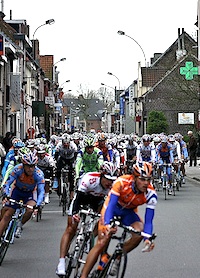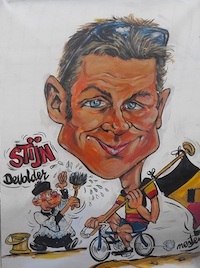 Despite the fact that they are not “true” classics, this past weekend’s racing at the Omloop and KBK marked the first time that (to my day-job addled knowledge) trade teams have taken each other on in a high-profile one-day event without the use of radio earpieces. And while I hesitate to view a single weekend in February as a referendum on the quality of the sport without radio earpieces, I’d have to say that if it was, the jury is very much still out.
Despite the fact that they are not “true” classics, this past weekend’s racing at the Omloop and KBK marked the first time that (to my day-job addled knowledge) trade teams have taken each other on in a high-profile one-day event without the use of radio earpieces. And while I hesitate to view a single weekend in February as a referendum on the quality of the sport without radio earpieces, I’d have to say that if it was, the jury is very much still out.
It’s no secret I’m pro-radio. But not because I’m an ideologue in the vein of a Johan Bruyneel, or because I’m a safety geek, but because it doesn’t make much sense to me to ban something that’s kinda hard to ban for— essentially—the sake of romance. I readily concede that many of cycling’s regulations (the double diamond frame) are for the nods to tradition, but like disc brakes in cyclocross, radios are part of naturally evolving technology.
Some people think they make the racing worse; I think these people are either uninformed or watch the exclusively Tour de France and get cranky during the flat stages. Take Stijn Devolder at the Omloop—some said he was caught out, while others are reporting he had a mechanical failure, and with no radio to call up for a car and a bike change, was forced to just make it work.
While I miss the good old days when MTB riders had to race the gear they started with, road cycling has been a fully-supported sport for decades now, and I think there are very few people would would argue that’s a bad thing. For my money (if there were a way to buy bike racing coverage in this country), I want Devolder to have a functional bike under him as often as possible, so he can start stomping the living daylights out of everyone (or at least trying to) at 60km to go.
You’ll get no argument from me that Boonen and Hushovd kinda paddy-caked it on Saturday (Flecha mentioned he made his attack when he saw them cranking gears too large to respond from), or that the race as it played out was anything but entertaining, but an irascible Devolder, pumping adrenaline as he roared back on from a frantic bike change, might have made the story a bit more interesting than he did towing Chase Group 3 for the final 30k.
 Sunday’s action at KBK was similarly unconvincing as far as the radio arguments go. Aside from a spectator getting creamed by a wayward Rabobank rider inside two KM to go, not much happend that might have otherwise been avoided with radio communications.
Sunday’s action at KBK was similarly unconvincing as far as the radio arguments go. Aside from a spectator getting creamed by a wayward Rabobank rider inside two KM to go, not much happend that might have otherwise been avoided with radio communications.
But the dashing, devil-may-care attacks, timed with precision for catches and tight sections of road—the sort of thing anti-radio folks seem to think would happen every day if not for those darn earpieces—failed time, after time, after time.
It could be argued that a “nervous” peloton were forced by their lack of communication to keep the chasers close, but (ignoring the fact that this argument “blames” radios for pretty much any type of finish) the pack hardly seemed on edge, remaining roughly egg-shaped for most of the day, except when driven by the familiar precision paceline of a well organized chase or leadout train. There was plenty of the usual bumping in tight quarters, but a relative dearth of crashes goes further toward discrediting “nervousness” due to missing radios.
All that said, the important take away from this is that the racing didn’t suffer without radios—and for me, quality of racing is what matters. Plenty of bold moves were made in both races, and while we may have have lost one or two potential players due to the radio silence, it’s no more entropy than is introduced by cobbles, crosswinds, crosswalks or any of the other chaos part and parcel in a Northern Classic. A few cartoonists had a good time, but looking back Monday, it was just another weekend in Flanders.
And that—radios or otherwise—is just fine with me.
It’ll be interesting to see how the radio ban plays out over the course of the season. Will it make more of a difference in week three of a grand tour, or in the October classics, when the peloton will be more ragged and the teams less well-drilled than then are in the spring? Will it make more of a difference when there are hills in the equation? At least, as you say, it hasn’t had much of a negative effect yet.
A bunch of good points Cosmo. It would be an interesting transition to have essentially twitter feeds (one way at least) into the Garmin units on the stem. As you say, hard to control all of the widgets. When exactly did use of in-race radios start? The Wiki on road bicycle racing suggests it was in the 90s. Does this latest move to ban radios really put things back just 15 or so years? That leaves a lot of exciting years as a model for how things could be.
…any truth to the rumor that bruyneel has convinced his team that radioshack is willing to re-up their sponsorship if the riders are willing to have miniature ‘receiving units’ surgically implanted in their heads ???…
…or did i just imagine that ???…
@David — I think the Motorola team started using radios circa 1992 as part of a promotion by their sponsor.
A very good post, Cosmo; I found myself nodding in agreement with a number of your points, despite being a bit anti-radio myself.
I’ve a vague and possibly empirically unsubstantiated notion that radios give too much control over tactics to DSs in the cars, and that riders become mere automatons. This is no doubt overstating it somewhat, but I suspect that’s where most of the concerns lie.
Safety concerns, and getting spare bikes to riders, is for sure an issue. Perhaps if radios could just transmit from the riders, and not receive, that could be a solution. But then it’s just starting to get complicated.
Wasn’t last year’s Worlds run without radios?
Enjoyed your series of tweets on Sat but missed a repeat on Sunday ! Blogged about the Radio ban in Jan & Feb and think the one way (rider to air) is a solution worth exploring !
Driving a Sydney cab in the mid 80’s whenever i pressed the button i was ID’d and so it would be with the racers . Problems could be solved , help sought and continuity preserved .
Removing a “tool of the trade” disadvantages All ! Unless we are going back to earlier times when there were no carbon bikes and the racers carried their spares then the lack of radios will have little effect on results .
…i’d suggest they only use radios wherein the riders could broadcast their requests (ie: equipment needs &/or food & water) through a central “race radio” & that info could then be transmitted to team directors…
…safety issues would be the responsibility of race radio & thus riders & directors could remain informed & vigilant but tactical information could be curtailed…
…would there be teams or individuals trying to cheat ???…yes, undoubtedly so…there’d be some techno-genius who’d be ahead of the latest electronic curve that would be offering services to likely candidates, just as there have been nefarious medical professionals doing the same with drugs all alone…
…(…you thought i was joking about implants, huh ???…if radios are ultimately banned, it would not surprise me in the least were the idea tried somewhere down the line…)…
…i like the aspect of marshaling safety but i also wanna see riders utilizing strategy amongst themselves rather than simply being fed tactics…
“..radios are part of naturally evolving technology.” One could say motorcycles are just as much a natural evolvement of technology when you recall the first ones were bicycles with motors attached. BUT the rules don’t allow motorcycles to be used by the racers for the same reason marathon runners are prohibited from riding a bicycle.
The safety issue is pure baloney — have crashes, etc. been greatly reduced since the early 90’s when earpieces were introduced? Prove it.
The DS doesn’t want to give up the technology to tell his riders what to do and (most) riders don’t want to have to think for themselves – they’d rather have the DS tell them what to do and then if it doesn’t work out it’s the director’s fault. None of this is a surprise.
I think the UCI’s correct in banning radios, just as they ban motorcycles, recumbents, etc. from bicycle races.
It’s a SPORT, with rules designed to determine who can perform within certain limits. In the 100 meter dash at the Olympic Games you must run using your own legs, in the 100 meter hurdles you must go over (or through, but NOT under) the hurdles even though it would be far quicker if the hurdles were avoided entirely.
It’s not about “naturally evolving technology” at all, it’s competition between athletes using bicycles, NOT bicycles piloted by athletes under the radio-controlled direction of the team boss.
I say ditch the radios…and if safety is the issue, connect the rider’s earpiece to a centralized race-control to warn them of upcoming obstacles. No instructions to riders via radio from team cars! One of the worst examples of this to me was back when a certain DS watched the race on TV from his car, then phoned a certain doctor (from the car) watching on TV at home to inquire as to whether rider B could keep up this pace and for how long? Then the DS radioed his rider with the doc’s opinion so he could adjust his tactics accordingly — in the past the guy would have had to look his competitor in the eye and decide for HIMSELF!